A Mentoring Competence Framework for the European Solidarity Corps
![MuC Mentoring Competence Framework [title slide]](https://michaelkimmig.eu/wp-content/uploads/2024/12/MuC-Framework-title-800x450.jpg)
The Mentoring Competence Framework for the European Solidarity Corps has been developed by the Mentoring under Construction Community. This article is an update and walks you through the latest version of the tasks and competences of the framework that has been launched in November 2024.
A mentor provides support and guidance to a young person during their volunteering journey.
Mentoring is one of the main support measures of the European Solidarity Corps programme. Mentoring contributes both to the value of the volunteering project as well as the well-being of the volunteer.
This Mentoring Competence Framework was developed to provide a clear and effective guidance for mentoring practiconers. This includes mentors who would like to develop their mentoring competence and improve their mentoring practice, project coordinators who would like to set up and offer a quality mentoring programme within their organisation, facilitators and trainers who would like to design and carry out workshops and training courses on mentoring as well as National Agencies and SALTO Resource Centers that would like to support mentoring initiatives withing the ESC Programme.
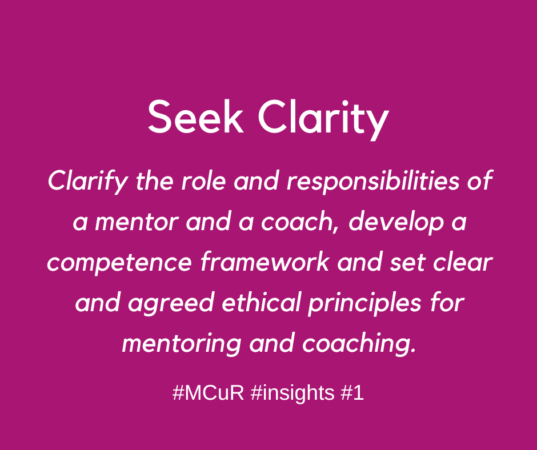
This Mentoring Competence Framework was developed by mentoring practicioners of the Mentoring under Construction Community, a community that supports learning and developing mentoring and coaching competences and helps improving the quality of mentoring and coaching within the European Solidarity Corps programme (and beyond). Find out more about how this framework was built at the end of this article.
The main purpose of the Mentoring Competence Framework is raise the quality of mentoring support within European Solidarity Corps projects providing a clear and effective guidance for mentoring practicioners.
The Mentoring Competence Framework in European Solidarity Corps
- helps clarify the role and tasks of a mentor,
- balances the need for clarity and the flexibility of adjusting mentoring the the local and organisational context,
- supports the recognition of mentor competences, and provides useful guidelines for designing training courses for mentors and coaches.
Let’s explore the Mentoring Competence Framework
The structure of the Mentor’s Competence Framework
A framework is a basic conceptional structure (Merriam Webster Dictionary) or a system of rules, ideas, or beliefs that is used to plan or decide something (Cambridge Dictionary). A competence framework is a structure that defines competence and behaviours required by individuals working in an organisation. A competence framework ideally aligns required tasks, behaviours that are required, valued, recognized and rewarded to carry out those tasks and knowledge, skills and attitudes that individuals need to perform and fulfil their role and tasks in an organisation. Additionally a competence framework can include and touch on values, mindset and/or ethical practices if necessary.
In line with the recommendations of the Mentoring and Coaching under Research report, a Mentor’s Competence Framework should cover the following three areas: the tasks of a mentor and the competences that are needed to fullfil these tasks (mentoring competences). Additionally we described foundations of mentoring, meaning important values and mindset of mentoring and guidelines for mentoring (code of conduct).
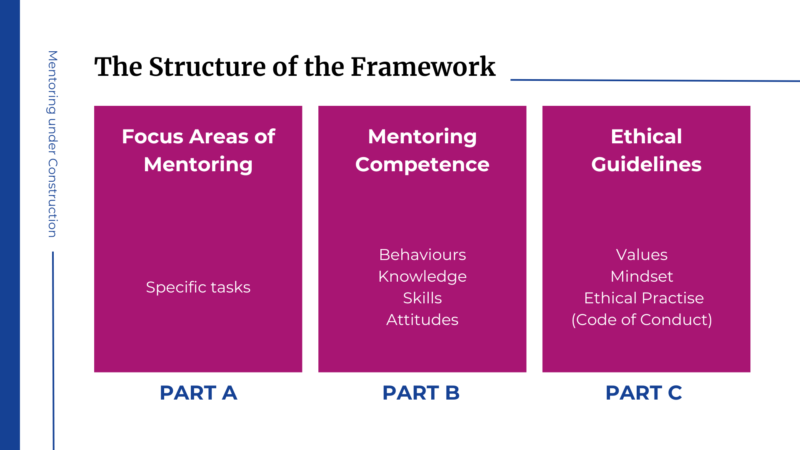
The Tasks of a Mentor: 9 Focus Areas
A task is a usually assigned piece of work that is often to be finished within a certain time.
Merriam Webster Dictionary
Taking a very broad perspective we asked what tasks are in place to support the volunteering journey of a young person in the European Solidarity Programme. Together with the Task Force we came up with a list of 10 tasks of a mentor.
The Tasks of a Mentor: 9 Focus Areas
- Assisting the volunteer in local and cultural integration
- Supporting the volunteer’s well-being
- Assisting the volunteer in dealing with difficult situations and conflicts
- Facilitating learning and development
- Raising awareness of the ESC Programme’s values
- Ensuring inclusion
- Facilitating orientation and integration with the organisation
- Managing groups and teams
- Planning, documenting and reporting
Source: Mentoring under Construction [December 2024]
In order to get a better overview, we put them in three groups:
- Providing guidance
- Increasing impact
- Enhancing collaboration
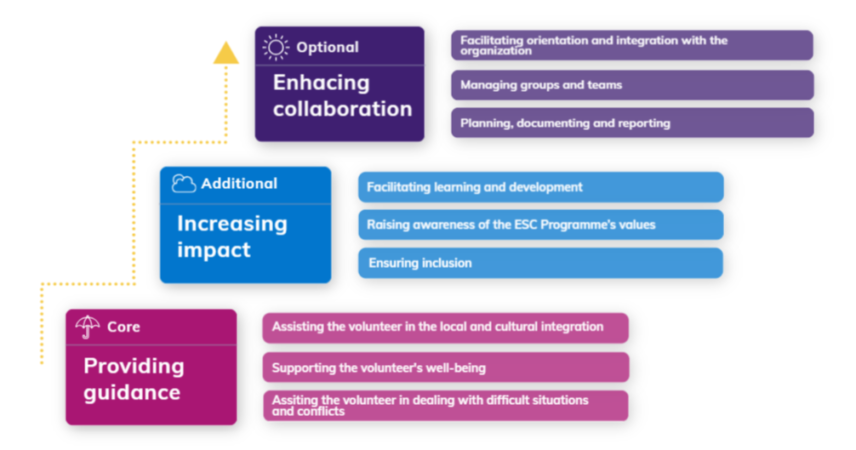
Providing Guidance (core)
The role of a mentor in providing guidance to volunteers is holistic, encompassing not only the specific tasks but also the personal and cultural aspects of the volunteer experience. As a support person, the mentor offers orientation, helps navigate challenges and ensures a positive, enriching experience for the volunteer. The core focus areas in providing guidance include:
- Assisting the volunteer in local and cultural integration
- Supporting the volunteer’s well-being
- Assisting the volunteer in dealing with difficult situations and conflicts
Increasing Impact (additional)
The mentor’s role in increasing impact involves fostering a culture of continuous learning and development, promoting the values of the ESC Programme and helping to create an inclusive and safe environment for the volunteer. The focus areas of increasing impact are additional and include:
Enhancing collaboration (optional)
The mentor’s role is to encourage and empower volunteers to integrate and collaborate with others, enabling them to make meaningful contributions to the organisation. This may include providing ongoing training and regular feedback to the volunteer. Mentors also plan and document their mentoring activities and give feedback to the organisation to improve the volunteer’s experience and project outcomes. Enhancing collaboration includes optional focus areas such as:
- Facilitating orientation and integration with the organisation
- Managing groups and teams
- Planning, documenting and reporting
An effective approach to implementing and improving mentoring support is to start by providing guidance, which encompasses the core focus areas of mentoring. From there, additional focus areas can be introduced to increase the impact of mentoring, while optional focus areas further enhance collaboration.
An effective approach to implementing and improving mentoring support is to start by providing guidance, which encompasses the core focus areas of mentoring. From there, additional focus areas can be introduced to increase the impact of mentoring, while optional focus areas further enhance collaboration.
Focus areas and specific tasks
Each focus area has a list of specific tasks. Here is an example:
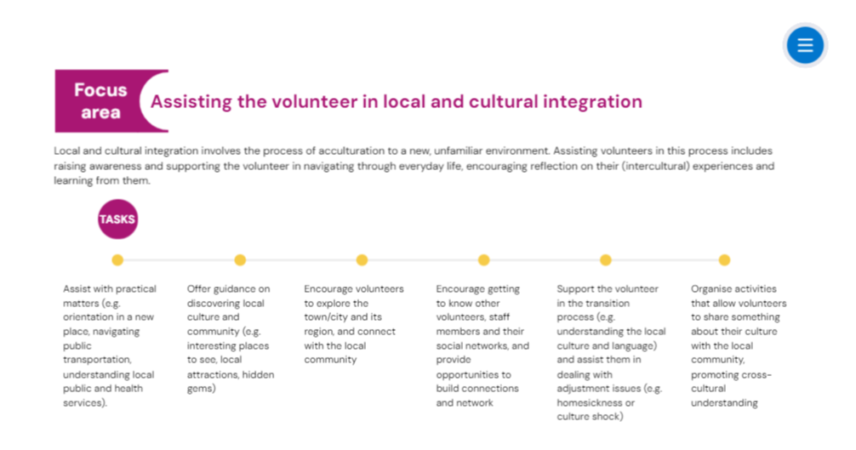
Download: The Tasks of a Mentor | A Mentor’s Competence Framework (coming soon!)
Focus Areas and Mentoring Competences
Here, we provide an overview over focus areas and competences related to them.
Providing Guidance (core competences, essential for all mentors)
Assisting the volunteer in local and cultural integration
- Facilitating cultural navigation and awareness
- Fostering intercultural learning and reflection
- Building trusting relationships
Supporting the volunteer’s well-being
- Raising awareness of well-being
- Supporting well-being practices
Assisting the volunteer in dealing with difficult situations and conflicts
- Providing support in managing difficult situations
- Providing support in managing conflicts
- Supporting (self-)regulation of emotions
Increasing Impact (additional competences, enhancing the impact of mentoring)
Facilitating learning and development
- Raising awareness of learning and development
- Supporting planning and implementation of learning and development
- Supporting reflection and assessment of learning and development
Raising awareness of the ESC Programme’s values
- Raising awareness of the Programme’s values
- Supporting alignment of activities with the Programme’s values
Ensuring inclusion
- Creating an accessible and safe environment for volunteers
- Providing reinforced mentorship
Enhancing collaboration (optional competences, enhancing collaboration and long-term impact)
Facilitating orientation and integration with the organisation
- Supporting the onboarding process
- Supporting volunteers’ integration within the organisation
Managing groups and teams
- Supporting team-integration process
- Supporting team cooperation
Planning, documenting and reporting
- Planning mentoring support
- Documenting mentoring activities
- Reporting to the organisation
Download Mentoring Tasks and Competences | A Mentoring Competence Framework (coming soon!)
Mentoring Foundations: Values – Mindset – Guidelines
A holistic approach to learning and development means addressing the head (thinking), the heart (feeling) and the hands (doing). „Learning by head, hand and heart” – a principles going back to Johann Heinrich Pestalozzi – can be found today in the centre of various learning and educational settings, including our field of Non-formal Learning.
We borrowed this principle to conceptualise values, mindset and ethical guidelines:
- Values – the heart – are a set of principles and standards that guide our behaviour and actions.
- Mindset – the mind (or head) is a set of intentions and beliefs that help us to orient in our decisions and actions.
- Ethical Guidelines / Code of Conduct – the hand – are a set of (written) rules and guidelines for quality mentoring.
Why are values, mindset & ethical guidelines important?
Values, mindset and a code of conduct are the foundations of a competence model for mentors. They encouraging effective and ethical mentoring relationships and mentoring practice that support and guide the learning and development of volunteers.
Values, mindset, and ethical guidelines ensure…
- guidance and consistency: they provide a clear direction and guidance for the behaviour of mentors and ensure consistency within and across mentoring relationships,
- trust and credibility: these principles help building trust and credibility between mentors and their volunteers and create a safe and supportive environment for learning and development,
- professional development: they invite and encourage mentors to reflect on and improve their behaviours and practices and contribute to their professional development and effectiveness,
- positive outcomes: these principles help fostering positive mentoring relationships that enhance the learning and development of their volunteers.
What values, mindset & ethical guidelines are important for ESC Mentoring
- What values inspire mentoring?
- What mindset fosters quality mentoring?
- What guidelines should include a code of ethics for mentors?
During our Meeting in Vienna, we brainstormed and discussed important values that drive mentoring. We had a huge collection of values. In the end we narrowed it down to four values: Integrity, Self-Agency, Dignity and Togetherness.
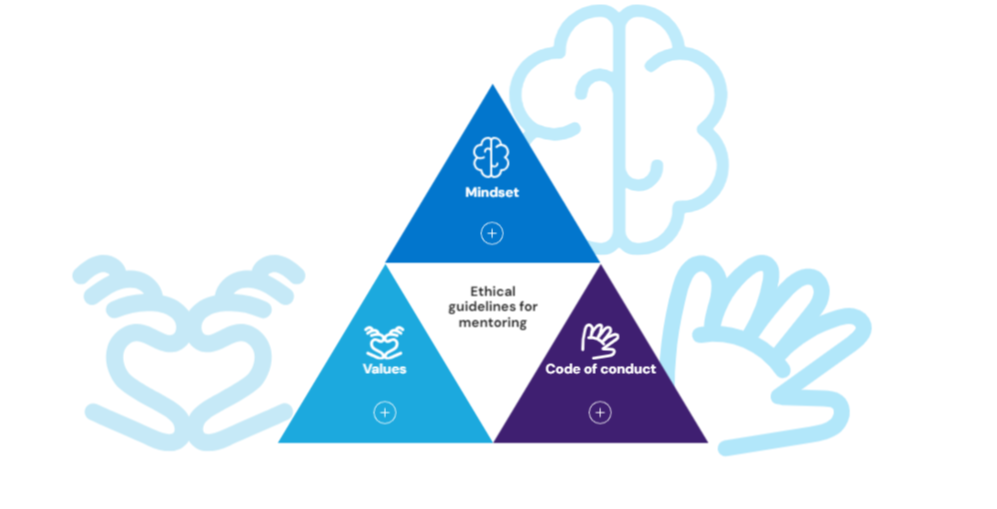
A Mentors’ Competence Framework | Slides
A Mentor’s Competence Framework by TOSCA POOLSeek Clarity! Building a Mentors’ Competence Framework
![A Mentor’s Competence Framework [04]](https://michaelkimmig.eu/wp-content/uploads/2024/05/A-Mentors-Competence-Framework-04-800x450.jpg)
Spotlight ON! Mentoring under Construction
![Mentoring under Construction FB Community 2024 [Andreea Buzec]](https://michaelkimmig.eu/wp-content/uploads/2024/12/MuC-FB-Community-2024-Andreea-Buzec-862x450.png)
Mentoring under Construction (MuC) is a community of practitioners who share a passion for mentoring/coaching. The MuC Community is open for everyone who is interested in raising the quality in mentoring and coaching within European Solidarity Corps programme (and beyond) including mentors, project managers/organisers, coordinators of volunteers, facilitators of learning, authors and trainers, and members of National Agencies and SALTO Resource Centres. Mentoring under Construction was founded in 2019 by the Romanian National Agency for European Solidarity Corps with the support of SALTO European Solidarity Corps Resource Centre and is cooperarting with various other National Agencies.
Mentoring under Construction | SALTO
Mentoring under Construction Community | Facebook
The main activities, events and initiatives of Mentoring under Construction aim at:
- building a vibrant, resourceful and sustainable community of mentoring/coaching practitioners
- developing quality content around mentoring/coaching in order to support the developemtn of mentoring competences,
- contribute to the quality of mentoring/coaching within the European Solidarity Corps
One initiative of Mentoring under Construction was a research project on the state of mentoring and coaching within the European Solidarity Corps.
The state of mentoring within the European Solidarity Corps
Mentoring and Coaching under Research (MCUR) explored mentoring and coaching practices within the European Solidarity Corps programme. One of the main insights of this research was the necessity to clarify the tasks of a mentor, the competences and ethical practices needed to carry out the role as a mentor.
Seek Clarity! A Mentoring under Construction Initiative
The framework was developed together with a Task Force, a group of experts from the Mentoring under Construction Community. The insights and recommendations of McuR proviced served as a starting point and provided a clear focus.
Seeking clarity became the main motor for a new Mentoring under Construction Initiative to develop a mentors’ competence framework that would clarify the tasks of a mentor, the competences needed and a set of ethical principles for mentoring. A mentor’s competence framework would contribute to the European Solidarity Corps programme and bring clarity for many actors in this field: mentors, project managers and project coordinators, trainers, authors, researchers.



![MuC Mentoring Competence Framework [title slide]](https://michaelkimmig.eu/wp-content/uploads/2024/12/MuC-Framework-title-520x245.jpg)